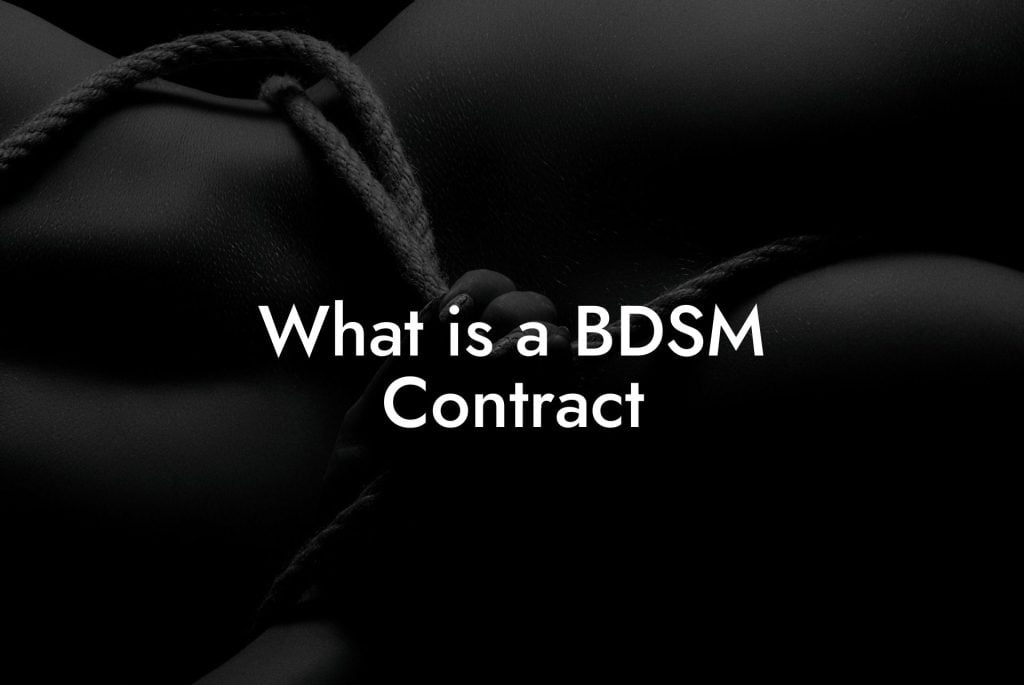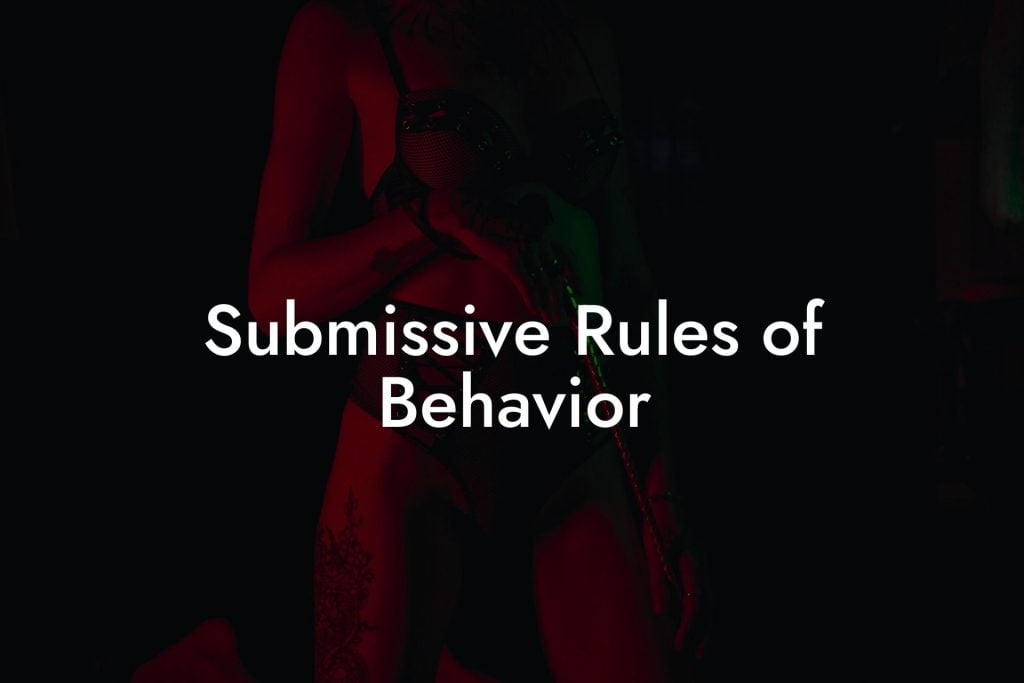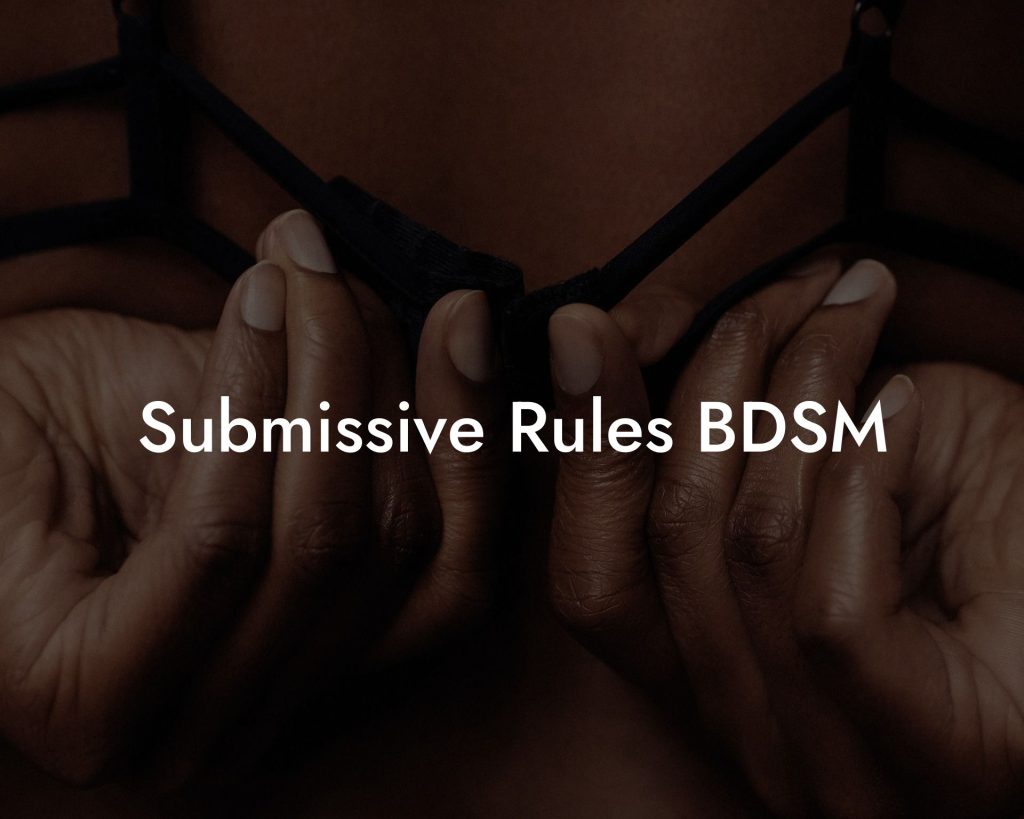Are you curious about the dominant-submissive dynamics and eager to explore the world of BDSM? If so, you've come to the right place. In this detailed and engaging Dominant Submissive Contract article, we will guide you through the essentials of establishing healthy boundaries, effective communication, and power exchange. Whether you're a seasoned practitioner or a curious beginner, read on to discover how to navigate this fascinating aspect of the BDSM lifestyle.
1. Understanding the Dominant Submissive Relationship
- Definition of dominant-submissive dynamics
- Importance of consent and negotiation
- Roles and responsibilities in a D/s relationship
2. Establishing Clear Boundaries
- Identifying hard and soft limits
- Negotiating and revisiting boundaries
- The significance of safe words for maintaining consent
3. Effective Communication
- Importance of open and honest communication
- Active listening and expressing desires
- Conflict resolution techniques within a D/s context
4. Exploring Power Exchange
- Types of power exchange dynamics
- Surrendering control and embracing vulnerability
- Rituals and protocols to enhance the power exchange experience
Dominant Submissive Contract Example:
Imagine you and your partner have decided to engage in a dominant-submissive relationship. You both sit down together to discuss boundaries and establish a Dominant Submissive Contract. By openly communicating your desires, limits, and expectations, you create a strong foundation of trust and understanding. This contract serves as a roadmap for your dynamic, outlining the specific roles, responsibilities, and agreed-upon activities. You both feel excited to embark on this journey together, confident in the mutual commitment to respect and explore this power exchange.
Frequently Asked Questions
What is a BDSM contract?
A BDSM contract is a written agreement between individuals involved in BDSM activities, outlining the responsibilities, limits, and expectations of the relationship. It serves to create a clear communication pathway and ensure that consent is explicitly given and understood by all parties involved.
How important is consent in BDSM?
Consent is the cornerstone of BDSM. Every activity within a BDSM interaction must be consensual, informed, and negotiated between all participants. Without clear and enthusiastic consent, any BDSM activity could be harmful and potentially illegal.
Can a BDSM contract be legally binding?
No, a BDSM contract is not legally binding in the same way as a commercial or civil contract. It is more of a personal agreement between the parties involved and primarily serves to ensure clarity and mutual understanding regarding their activities and relationship dynamics.
What is meant by 'power dynamics' in BDSM?
In BDSM, power dynamics refer to the relationship roles of dominance and submission that participants choose to take on. These roles define how each person involved in the scenario will behave and relate to one another, usually with one person holding more control or power over the other during their interactions.
How can I ensure safety during a BDSM session?
Safety during BDSM sessions can be ensured through good communication, setting clear boundaries, observing safe words, and being aware of each other's physical and emotional limits. In addition, possessing knowledge of safe practices and trusting each other are essential components of a secure BDSM interaction.
What is a safe word and why is it necessary?
A safe word is a pre-agreed signal used during BDSM activities to communicate that a participant needs to stop or pause the action. It is a critical safety mechanism that ensures all parties can halt activities at any moment should they feel uncomfortable or in danger.
What's the difference between a safe word and a safe signal?
A safe word is a verbal cue, while a safe signal is a non-verbal cue that can serve the same purpose as a safe word, used when one cannot speak, for example during gag play. Both safe words and signals are equally important tools to maintain communication and safety.
How do you negotiate a BDSM scene?
Negotiating a BDSM scene involves open communication about expectations, desires, boundaries, and limits. All parties should discuss and agree upon every aspect of the scene, including roles, actions, safe words, aftercare, and any potential risks before engaging in the play.
What is aftercare in BDSM?
Aftercare refers to the attention and care given to participants following a BDSM scene. It includes any emotional or physical care that is needed to return all involved to a state of well-being. Aftercare is a crucial part of any BDSM activity as it helps to re-establish normalcy and maintain a good rapport between participants.
Are BDSM activities legal?
BDSM activities are generally legal as long as they are consensual and all involved are of legal age to give consent. However, the legality can vary depending on local laws, so it's essential to understand and abide by the laws in your jurisdiction.
Do you have to have a BDSM contract to participate in activities?
No, you do not have to have a BDSM contract to participate in activities, but having one is a good practice to enhance clear communication, lay out expectations, and consensual terms of your encounters. It also serves as a reference for discussing potential scenarios and boundaries.
Can someone withdraw their consent during a BDSM session?
Yes, consent can be withdrawn at any point during a BDSM session. Once consent is withdrawn, all activities must stop immediately, and the participants should check in with each other to understand the change in consent and provide the necessary support or aftercare.
How should someone approach their first BDSM negotiation?
Approaching your first BDSM negotiation should be done with honesty and openness. Come prepared to discuss your interests, boundaries, experience level, and trust factors while also being ready to listen to your partner. Starting with less intense activities and clearly defined limits can help ease the process.
Is it okay to have feelings of anxiety or hesitation about BDSM?
Yes, it is perfectly normal to have feelings of anxiety or hesitation about BDSM. Engaging in open and non-judgmental conversations about these feelings can help understand and mitigate concerns. Taking things slowly and choosing trustworthy partners are also key to a comfortable experience.
Can BDSM contracts include emotional boundaries?
Yes, BDSM contracts can and should include emotional boundaries to ensure that all parties' mental well-being is considered. Discussing emotional limits and aftercare needs is an important aspect of ensuring a positive BDSM experience.
Should limits be tested or pushed in a BDSM scene?
Limits should never be tested or pushed without prior negotiation and explicit consent. Respecting established boundaries is vital for trust and safety in a BDSM relationship. If individuals wish to explore their limits, this should be discussed and agreed upon beforehand.
How does one establish trust with a BDSM partner?
Establishing trust with a BDSM partner involves open communication, honesty, following through on agreements, respecting boundaries, providing consistent aftercare, and building a rapport over time. It's a gradual process that both partners contribute to through their actions and behavior.
What should I do if I'm injured during a BDSM session?
If you're injured during a BDSM session, it's important to stop the play immediately, address the injury by seeking appropriate medical attention if required, and discuss what went wrong with your partner. It's essential to analyze and improve safety procedures for the future.
Is it necessary for everyone in the BDSM community to have a contract?
While it's not necessary for everyone in the BDSM community to have a contract, it is considered a best practice for minimizing misunderstandings and ensuring consent. A contract can be particularly useful for those new to the scene or those starting new relationships.
What resources are available for learning more about BDSM safety?
There are numerous resources available for learning about BDSM safety, including books, websites, community workshops, and mentorship from experienced practitioners. Online forums and local BDSM community groups often offer guidance and education on safe practices.
How can I ensure my privacy when exploring BDSM?
Ensuring your privacy when exploring BDSM involves being selective about the people you share information with, using pseudonyms or scene names if desired, and being cautious about sharing personal details, especially in public or online forums. Good practices include having clear discussions with partners regarding privacy expectations and understanding their approach to discretion.
Now that you have a clearer understanding of the dominant-submissive dynamics, it's time to embrace this thrilling lifestyle with confidence. Share this article with others who may find it informative, and don't forget to explore Filthy Adult for more insightful guides, our Ultimate BDSM Contract Pack, and a wide selection of fetish products to enhance your experiences. Remember, healthy exploration of power exchange starts with informed consent and open communication. Enjoy your journey into the exciting world of BDSM.













